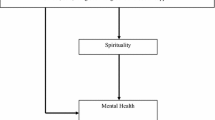Abstract
US students with higher spirituality scores report better health and life satisfaction. This is the first UK study to explore the relationship between spirituality, health and life satisfaction of undergraduate students. Over 500 undergraduates completed an online questionnaire. Significant differences in spirituality score were present across college, ethnicity and religious belief. There appears to be a desire for spirituality amongst many students. Universities have a role to play in supporting students’ search for meaning and purpose. Additional research is warranted to further understand the role of spirituality in the health and well-being of undergraduates.
Access this article
We’re sorry, something doesn't seem to be working properly.
Please try refreshing the page. If that doesn't work, please contact support so we can address the problem.

Similar content being viewed by others
References
Astin, A. W., Astin, H. S., & Lindholm, J. A. (2011). Cultivating the spirit: How college can enhance students’ inner lives. San Francisco: Jossey-Bass.
Cavendish, R., Luise, B. K., Bauer, M., Gallo, M. A., Horne, K., & Medefindt, J. (2001). Recognizing opportunities for spiritual enhancement in young adults. Nursing Diagnosis, 12, 77–92.
Clark, P. A., Drain, M., & Malone, M. P. (2003). Addressing patients’ emotional and spiritual needs. Joint Commission Journal on Quality and Safety, 29(12), 659–670.
Cohen, S., & Hoberman, H. (1983). Positive events and social supports as buffers of life change stress. Journal of Applied Social Psychology, 13, 99–125.
Fabricatore, A. N., Handal, P. J., & Fenzel, L. M. (2000). Personal spirituality as a moderator of the relationship between stressors and subjective well-being. Journal of Psychology and Theology, 28, 221–228.
Fleming, S., & Evans, D. S. (2008). The concept of spirituality: Its role within health promotion practice in the Republic of Ireland. Spirituality and Health International, 9(2), 79–89.
Frisch, M. (2006). Quality of life therapy: Applying a life satisfaction approach to positive psychology and cognitive therapy. Hoboken, NJ: Wiley.
General Medical Council. (2009). Tomorrow’s doctors. Available: http://www.gmc-uk.org/. Accessed 10 Jan 2010.
Grant, L., Murray, S. A., & Sheikh, A. (2010). Spiritual dimensions of dying in pluralist societies. British Medical Journal, 341, c4859.
Hay, D., & Hunt, K. (2000). Understanding the spirituality of people who don’t go to church. Available: http://www.spiritualjourneys.org.uk. Accessed 20 Oct 2009.
King, M. B. (2009). Conceptualising spirituality for medical research and health service provision. BMC Health Services Research, 116, 1472–6963.
Koenig, H. G., McCullough, M. E., & Larson, D. B. (2001). Handbook of religion and health. Oxford: Oxford University Press.
Larson, D. B., Swyers, J. P., & McCullough, M. E. (1998). Scientific research on spirituality and health: A report based on the scientific progress in spirituality conferences. Bethesda, MD: National Institute for Healthcare Research.
Lawler-Row, K. A., & Elliott, J. (2009). The role of religious activity and spirituality in the health and well-being of older adults. Journal of Health Psychology, 14, 43–52.
Miller, W. R., & Thoresen, C. E. (2003). Spirituality, religion, and health—an emerging research field. American Psychologist, 58, 24–35.
Nagel, E., & Sgoutas-Emch, S. (2007). The relationship between spirituality, health beliefs, and health behaviours in college students. Journal of Religion and Health, 46(1), 141–154.
National Centre for Social Research. (2010). British social attitudes survey. The 26th report. Available: http://www.natcen.ac.uk. Accessed 23 May 2010.
Nelms, L. W. (2005). The relationship between spirituality and the health of college students in a university setting. Electronic dissertation, the University of Tennessee.
NICE Guidance. (2004). Improving supportive and palliative care for adults with cancer. Available: http://guidance.nice.org.uk/CSGSP. Accessed 15 Oct 2009.
O’Connell, K. A., & Skevington, S. M. (2010). Spiritual, religious, and personal beliefs are important and distinctive to assessing quality of life in health: A comparison of theoretical models. British Journal of Health Psychology, 15(4), 729–748.
Office for National Statistics. (2009). 2009 rehearsal questionnaire for England, 2011 census. Available: http://www.statistics.gov.uk. Accessed 30 Oct 2009.
Piedmont, L. R., Hassinger, C. J., Rhorer, J., Sherman, M. F., Sherman, N. C., & Williams, J. E. G. (2007). The relations among spirituality and religiosity and axis II functioning in two college samples. Research in the Social Scientific Study of Religion, 18(7), 54–73.
Sax, L. J., Gilmartin, S. K., & Bryant, A. N. (2003). Assessing response rates and nonresponse bias in web and paper surveys. Research in Higher Education, 44, 409–432.
Seybold, K. S., & Hill, P. C. (2001). The role of religion and spirituality in mental and physical health. Current Directions in Psychological Science, 10, 21–24.
Taylor, S. E. (2008). Health psychology (7th ed.). Boston: McGraw-Hill.
Webber, R. (2001). Young people and their quest for meaning. Youth Studies Australia, 21(1), 40–43.
Zullig, K. J. (2005). Using CDC’s health-related quality of life scale on a college campus. American Journal of Health Behaviour, 29, 569–578.
Zullig, K. J., Huebner, E. S., Patton, J. M., & Murray, K. A. (2009). The brief multidimensional students’ life satisfaction scale—college version. American Journal of Health Behaviour, 33, 483–493.
Zullig, K. J., Ward, R. M., & Horn, T. (2006). The association between perceived spirituality, religiosity, and life satisfaction: The mediating role of self-rated health. Social Indicators Research, 79, 255–274.
Acknowledgments
The authors would like to thank Lesley Roberts, Lisa Jones, Sayeed Haque, Roger Holder, Andrea Roalfe, Lesley Davies-Bailey, Sue Vahid and the students. This study was undertaken as part of a BMedSc degree in Public Health and Population Sciences and was funded by the University of Birmingham and an intercalated student award from the Association of Physicians of Great Britain and Ireland.
Author information
Authors and Affiliations
Corresponding author
Rights and permissions
About this article
Cite this article
Anand, V., Jones, J. & Gill, P.S. The Relationship Between Spirituality, Health and Life Satisfaction of Undergraduate Students in the UK: An Online Questionnaire Study. J Relig Health 54, 160–172 (2015). https://doi.org/10.1007/s10943-013-9792-0
Published:
Issue Date:
DOI: https://doi.org/10.1007/s10943-013-9792-0



